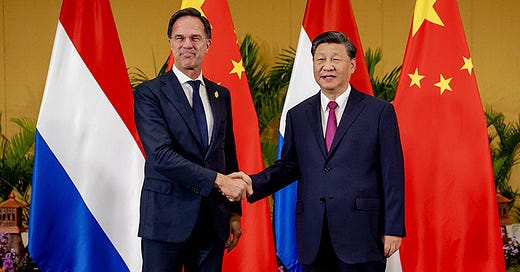Impending Dutch, Japanese Export Controls & The People’s Daily
Translating the Chinese Communist Party and State’s perspective on semiconductors
The Dutch and Japanese governments are poised to announce a new round of semiconductor export controls by the end of January to restrain China’s domestic chip industry and military modernization. These follow a crippling set of U.S. controls promulgated in October 2022 that have severely limited China’s access to advanced chips, semiconductor manufacturing equipment, software, and foreign talent.
Alignment between the U.S. and allied nations is critical for American policies restricting China’s semiconductor industry to be effective. Agreement by the Dutch government to restrict ASML’s ability to sell its most advanced lithography equipment to Chinese companies would also play against the Chinese Communist Party’s rhetoric of deepening Sino-European economic relations.
To contextualize the announcements to come, please enjoy this article I translated from the print edition of the People’s Daily (人民日报), the official newspaper of the Chinese Communist Party. Chip Capitols will be back next week with a think piece diving into the U.S. CHIPS and Science Act’s restriction on expanding in China and the unique policy innovation this represents.
*Correction (Jan. 29, 2023): This article that appeared in People’s Daily was originally published in Chinese by Reference News Network 参考消息网, which is owned by the state-owned Xinhua News Agency 新华通讯社. Reference News in turn adapted its article from commentary originally appearing in English in the U.K.-based The Telegraph. People’s Daily is a Party paper. Reference News is a State outlet that adapts foreign news stories that are of interest to Party members and the public.
[Any mistakes in translation are my own. Bold, bracketed texts are annotations provided for clarity. The original Chinese text is below.]
Europe Accelerates Deepening Economic Relations with China
November 14, 2022
Europe has chosen a side in the new Cold War – China.
In light of the rapid deterioration in relations between the West and China, many economies will have to pick a side.
The U.S. has imposed another round of severe technology sanctions on China. These are forcing American personnel to leave the country [China] and American companies to find alternate suppliers – often at a large cost. [This refers to the October 2022 round of U.S. semiconductor export controls.]
However, this indicates increasingly clearly which side the major European powers (as well as the E.U. itself) have chosen – China.
Major European powers are discussing why the West needs a united front, how it should confront China's increased political influence, and how to unite with the U.S. on the basis of common values. The problem, however, is that Europe is accelerating the deepening of its economic relations with China at the same time.
Have a look at some decisions from the past few months. Last week, the French auto giant Renault restructured a new division. As part of this, Renault’s engine manufacturing department will establish a joint venture with the ambitious Chinese company, Zhengye [Zhengye International Holdings Co Ltd].
The French government holds a 15% equity stake in Renault and is one of its principal shareholders. Accordingly, the company would not take any action without French government approval.
Germany has just allowed China Ocean Shipping Company to hold shares in a terminal at the Port of Hamburg, one of continental Europe’s most important ports. Meanwhile, [German] Chancellor [Olaf] Scholz flew to Beijing this month to promote trade.
Although batteries are a strategic industry, China is increasing battery production across Europe on a large scale. [In 2022], SVOLT [a Chinese EV battery producer] expanded a large new factory in Germany, and CATL [a Chinese EV battery producer] announced its plan to build Europe’s second largest [battery] factory in Hungary.
Occasionally, some countries attempt to limit China's growing influence on the European continent. For example, Germany decided last week to prevent China from acquiring two German semiconductor manufacturers. Such efforts, however, are very limited. Looking at all their significant decisions, major European powers are conducting more trade with China than ever before and are still making every effort to continue this growth.
In contrast, trade frictions between Europe and the U.S. are as tense as ever. Just this month, the E.U. lambasted President Biden's subsidies to American companies in the Inflation Reduction Act, complaining that the U.S. sacrificed European competitors to protect [the former’s] own industry.
The E.U. also complained to the U.S. that American subsidies for electric vehicles discriminate against European competitors. However, this makes the E.U. look hypocritical because it is also throwing enormous subsidies at its own green energy sector. It also recently passed the E.U. Chips Act in an effort to make itself as self-reliant as possible in the semiconductor industry.
Europe has hardly squandered any opportunity to provoke a trade war with the U.S., while steadily strengthening its trade and investment relations with China.
Industrial policy is far more important than words. Europe’s investment decisions make one thing increasingly clear: The major powers of the E.U. have chosen a side – that side is the East.
2022年11月14日
欧洲在新冷战中选择了一方——中国。
随着西方与中国的关系急剧恶化,很多经济体都将不得不作出选择。
美国对中国又实施了一轮严厉的技术制裁,美国人员离开该国,迫使美国公司寻找替代供应商——通常会巨大代价。
但已经越来越清楚地表明,欧洲主要大国(以及欧盟本身)选择了谁——那就是中国。
欧洲主要大国大谈西方如何需要统一战线,西方应该如何对抗中国增强的政治影响力,以及如何基于共同价值观与美国团结在一起。但问题是,与此同时欧洲也在加速深化与中国的经济关系。
看看过会几个月里的一些决定吧。上周,法国汽车业巨头需诺公司重组了新部门。其中制造发动机的部门将于雄心勃勃的中国正业公司建立合资正业。
法国政府持有需诺15%的股份,而且迄今为止是其主要股东。如果没有法国政府批准,需诺不会来取任何行动。
德国刚刚允许中国的中远公司持有汉堡港一个码头的股份。汉堡港是欧洲大陆最重要的港口之一。与此同时,朔尔茨总理本月飞往北京以促进贸易。
尽管电池是战略行业,但中国正在欧洲各地大规模增加电池生产。今年以来,中国的蜂巢能源公司已经在德国扩建了一家大型新工厂;制造商宁德时代宣布了在匈牙利建设欧洲第二家大型工厂的计划。
不时有国家试图限制中国对欧洲大陆日益增强的影响力——比如德国上周决定阻止中国收购两家德国半导体制造企业——但都非常有限。所有重大决定来看,欧洲主要大国在与中国展开比以往任何时候更多的贸易,而且还在竭尽全力继续增加。
相比之下,欧洲与美国的贸易摩擦一如既往地紧张。仅在本月欧盟就猛烈抨击拜登总统在《通胀削减法案》中向美国企业提供的补贴,抱怨其以牺牲欧洲对手为代价保护本国产业。
与此同时,它还向美国抱怨说,美国的电动汽车补贴歧视欧盟竞争对手。尽管这让欧盟显得很虚伪,因为欧盟也在向自己的绿色能源投入巨额补贴,而且最近通过了一项“芯片法案”,努力使自己在半导体领域尽可能自力更生。
欧洲几乎没有浪费任何机会挑起与美国的贸易战,同时却在稳步加强与中国的贸易和设资关系。
产业政策远比言语重要。欧洲的投资决定越来越清楚地表明,欧盟主要大国已经选择了一方——那一方在东方。




